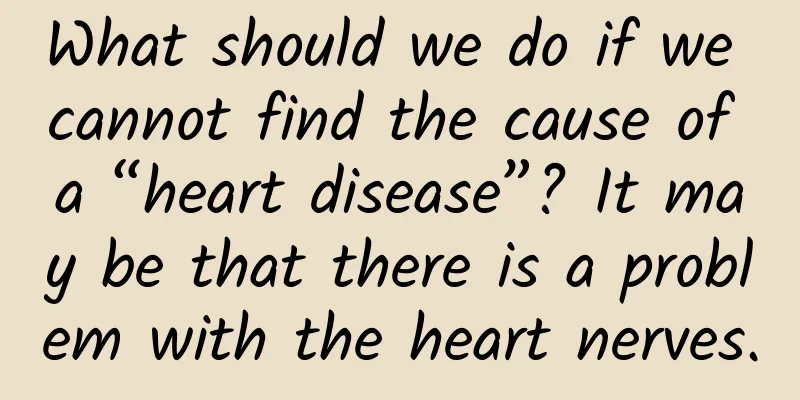What should we do if we cannot find the cause of a “heart disease”? It may be that there is a problem with the heart nerves.

|
I have come across several similar cases, which are worth sharing with you. Several friends have felt that they have tachycardia, premature beats, palpitations, chest tightness and other chest discomforts, thinking that there is something wrong with their heart. However, they went to the hospital to see a cardiologist for many tests, but no organic lesions were found. What should they do? Hua Zi said that there are many patients like this who give cardiologists headaches. The final solution is basically to have them see a psychological clinic. It is not that they have mental problems, but that there is something wrong with their heart nerves. Anti-anxiety treatment can achieve better results. 1. Heart disease with no known cause The development of modern medicine is mainly due to the level of science and technology. Various new instruments have been developed, which have turned doctors who used to rely on experience to guess what happened into "perspective eyes" that can accurately find the specific parts of the diseased muscles, blood vessels, structures, etc. on the heart. This kind of disease that can be "seen" directly is called organic disease, which can be treated by surgery, drugs, etc. However, many people will have symptoms similar to organic heart disease, but after various instrument examinations, the specific location of the disease cannot be found. The reason why these people have heart disease symptoms is that there is a problem with the heart nerves. The activity of the heart is regulated by the human autonomic nerves. When the heart autonomic nerves are disordered, symptoms similar to heart disease will appear, which is called cardiac neurosis. 2. Symptoms of cardiac neurosis People with cardiac neurosis are often sensitive, and they pursue perfection in some ordinary things. They are sentimental, tend to overthink things, and are easily influenced by negative suggestions. When they encounter work pressure, interpersonal tension, emotional frustration, etc., cardiac neurosis is easily induced. Symptoms include pain in the chest area when at rest, such as needle-like pain, dull pain, and muffled pain, which may last for several minutes or tens of minutes, but will not worsen, nor will there be hypoxia and a sense of impending death. Pain usually does not occur when you are busy. This is different from angina pectoris in patients with coronary heart disease, because patients with coronary heart disease often experience angina pectoris during activities due to coronary artery stenosis and insufficient blood supply. This pain is caused by the movement of the rib joints. If we press the rib joints along the left side of the midline of the sternum with our fingers, we can easily find the tenderness point. This is because the ribs move with breathing, and due to strain, the nerve endings are compressed at the joints. Therefore, this pain exists in everyone. When the human body is at rest, the pain threshold is lowered, and overly sensitive people will magnify this pain into chest pain, which is actually unrelated to the heart. Symptoms such as dizziness, palpitations, and numbness of the fingers are common in hyperventilation caused by panic attacks. Because of the feeling that one has "heart problems", out of fear, one will involuntarily increase the breathing rate, causing the body to exhale too much carbon dioxide (CO2), resulting in respiratory alkalosis, and symptoms such as tachycardia, dizziness, and numbness of the lips and fingers. In severe cases, one may feel like one is dying. When you are nervous and excited, your sympathetic nerves will be excited, causing tachycardia, and may also cause spasms in tiny coronary artery branches and tiny tracheae, resulting in symptoms of asthma and difficulty breathing. All of the above symptoms can be quickly relieved after arriving at the hospital and being checked to determine that there is no problem with the heart. So it is better to call it "heart disease" rather than "heart disease". 3. Anti-anxiety treatment is needed. Occasional cardiac neurosis will not affect health, but frequent attacks will interfere with normal rest and sleep. Moreover, if the patient has coronary atherosclerosis, when cardiac neurosis attacks, it may cause coronary spasm, induce rupture of sclerotic plaques, and cause myocardial infarction. Therefore, people with frequent cardiac neurosis should be treated. The causes of most cardiac neurosis are related to anxiety. Some patients also suffer from depression, which belongs to the category of psychology. They need to go to a psychological clinic to get proper treatment. While psychological counseling, the use of anti-anxiety and antidepressant drugs can relieve symptoms and cure the disease. To sum up, if you often have symptoms of heart disease, but cannot find organic lesions after a thorough examination, then it is very likely that there is a problem with the nerves of the heart, leading to cardiac neurosis. Most people can recover by self-adjustment after understanding the truth of this disease, but in severe cases, they need treatment from both the cardiology department and the psychology department to be cured. I am pharmacist Huazi, welcome to follow me and share more health knowledge. |
>>: FAQs on COVID-19 and urogenital diseases
Recommend
What should I do if my period bleeds too much?
Some women find that their menstrual flow is very...
Can I eat shrimp while breastfeeding?
During breastfeeding, because the body loses a lo...
Women suddenly become sensitive to smells
If a woman suddenly becomes more sensitive to sme...
Reasons for thick trapezius muscles in girls
If a girl has the problem of thick trapezius musc...
The impact of festivals on health is far more than just gaining weight丨Celebrate the Spring Festival in a healthy way (6)
It is easy to understand that dinner parties and ...
What to do if there is a small cut on the vulva
Female friends are actually very afraid that thei...
What causes abdominal pain before menstruation?
I believe that many women experience abdominal pa...
How long does a girl's teenage rebellion last?
I believe that many parents have certain worries ...
Precautions for ultrasound in the fourth month of pregnancy
The fourth month of pregnancy is a critical perio...
Swelling of the Adam's apple in the female neck
Women generally have smaller Adam's apples, w...
Symptoms of spleen deficiency and stomach heat in women
The mouth is the dialogue box of our stomach and ...
Cutting out carbs? Eating salad? Avoid these 10 pitfalls when losing weight after the Chinese New Year!
Dumplings, glutinous rice balls, sweet and sour p...
What causes longer menstrual cycles?
For women, if their menstrual cycle becomes longe...
Agomelatine can treat depression and improve sleep. What should you pay attention to when using it?
Huazi had not been sleeping well recently, so he ...









